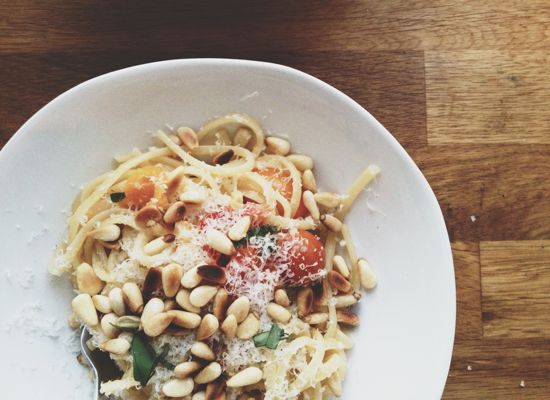I remember the evening well. I was sitting with my parents and boyfriend on the shaded patio of an Italian restaurant in Santa Barbara. This was one of those "let's take you out to dinner to be sure you're eating well" meals parents often take their children to when they're still in college. By this time I had been cooking for myself out of necessity for at least a year, but wasn't the most adventurous when it came to trying new dishes. When I scanned a menu, once my eye paused on Pasta al Pomodoro, the decision was made. But this particular evening, I couldn't shake the price. Although I wasn't paying for it, fourteen dollars for a bowl seemed somewhat unreasonable considering I could buy a bag of spaghetti, two pounds of tomatoes, some basil and cheese for less than $10 and have multiple servings. Suddenly, my mentality shifted as I began to realize that my favorite restaurant meals were achievable in my own kitchen.
I stopped ordering pasta al pomodoro after that. I also made a decision that I've kept with relative consistency in the years since: If I could make it at home, I wouldn't order it in a restaurant. The more I cooked for myself, the less I relied on restaurant meals to sustain me. Eating out became an experience, increasing in price as my boyfriend (now husband), and I, developed our palates.
When reading this poem, I couldn't help but think back to this memory as the speaker moves back and forth between her "city girl" present and the rural upbringing where she gathered cherry tomatoes, "their grubby bodies," into her skirt.
Cherry Tomatoes
Little bastards of vine.
Little demons by the pint.
Red eggs that never hatch,
just collapse and rot. Whenmy mom told me to gather
their grubby bodies
into my skirt, I'd cry. You
and your father, she'd chide—the way, each time I kicked
and wailed against sailing,
my dad shook his head, said
You and your mother.Now, a city girl, I ease one
loose from its siblings,
from its clear plastic coffin,
place it on my tongue.Just to try. The smooth
surface resists, resists,
and erupts in my mouth:
seeds, juice, acid, bloodof a perfect household.
The way, when I finally
went sailing, my stomach
was rocked from insideout. Little boat, big sea.
Handful of skinned sunsets.
There is a transforming moment in the poem that comes in the fifth stanza. Until then, we understand that the speaker is somewhat hesitant to go back to her roots. She lives elsewhere, has been on her own, and is now pulled back into the memories where she associates summer tomatoes as "little bastards of the vine" and "demons by the pint." Clearly, this was not her fondest chore.
But then she returns to the source. Educated, removed, her barriers up, and she can't help but place a tomato on her tongue. And when it bursts, its as if the juices coat her mouth, then her stomach, then her soul, and is left only with the sensation of sailing, being "rocked from the inside out."
It's a beautiful moment to read. We don't always know when certain memories will surface, what will trigger them, if they will be fond or difficult ones to think of, but I loved the reminder that if we're open, we can usually find the joy or the hope in any circumstance.
PASTA AL POMODORO
Because the marriage of pasta to sauce is near-impossible to achieve with capellini, I prefer to use a sturdier noodle like linguini or spaghetti to ensure I'll have a luscious sauce.
Extra-virgin olive oil
2 large garlic cloves
2 pounds cherry tomatoes, halved if very large
1 pound linguini
Parmesan cheese
Fresh basil
Salt and pepper
Toasted pine nuts (optional)
In a large sauté pan, heat a few tablespoons of extra-virgin olive oil over medium-low heat. Using a fine cheese grater, grate the garlic cloves into the sauce (or finely dice them). When the garlic is fragrant (about one minute), add the tomatoes and season with a pinch of salt. Let them cook until their juices have been released and their skins are tender, about 15 to 20 minutes. You want a natural sauce to start forming before cooking the pasta.
Bring a large pot of water to a boil, season generously with salt, and cook the linguini for 5-6 minutes. Drain, reserving 2 cups of the starchy liquid. If you used a big enough pan for the tomatoes, add the linguini on top. Otherwise, pour the linguini back in the pot you cooked it in, then pour the tomatoes on top, add in about 1 cup of the water, and crank the heat up. You want the cooking liquid and tomato juices to bubble away for a few minutes. It also helps to add some grated Parmesan cheese to help thicken the sauce. Add more water if it seems dry, and cook until the pasta is perfectly tender and a luxurious sauce has been formed.
Serve immediately, garnished with fresh basil, more Parmesan and toasted pine nuts, if you have some.





